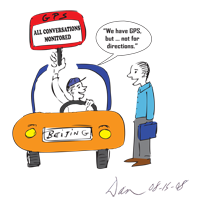




I did not expect that tight visa and security controls would reduce the number of passengers at the airport. The departure lobby is almost empty. In fact, at 2:30 p.m. on the first working day in Beijing since the start of the Olympics, we are the only passengers waiting at baggage claim. Two big Olympic mascot “Fuwa” balloons have been placed at the airport exit to welcome tourists to Beijing.
In the past, passengers have had to wait at least a half hour to get a taxi at busy times, but now I can get one right away.
If I were a robber, the control station would know this even if the taxi driver had not pressed an emergency button. All the taxis that I ride so far are very clean and have no barrier between the driver and passenger. Is Beijing safer now? I don’t know, but it seems to be.
Today is the 11th, so only cars with odd-number license plates can be out on the road. There is no traffic from the Beijing airport to downtown.
I see two young foreign backpackers with sweat on their faces looking at a map near the Beijing Hotel. They seem unwilling to ask for assistance in spite of the many volunteers who can be seen on the street. I approach them and ask, “Do you need any help?” One of them tells me they can not find their hostel and shows me the address. I tell them that it is still far away on foot and ask them why they do not take a taxi. This should cost them only 10 yuan.
The woman replies that they tried this, but the driver asked
for 60 yuan. They said they would rather walk with two heavy backpacks—60
pounds each, at least, I think. They are from England, but they have found it
difficult to ask for directions in English. I show them the way to go and wish
them good luck.
China is still at the top of the
gold medal list today.